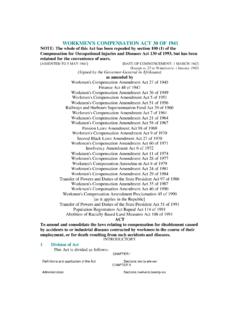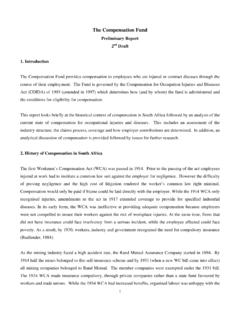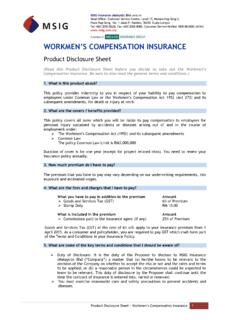Transcription of Workers’ Compensation Law - OWTL
1 Workers Compensation Law | Table of Contents iTABLE OF CONTENTSORIGINS & FOUNDATIONS The Meredith ReportsCommissioned and Task Force Reports: 1932 - 1973 FIRST MAJOR REFORMC hanges in the 1980s and 1990sWeiler Report Proposing the Creation of an Independent Appeals Tribunal Workers Compensation Reform, 19881991 Standing Committee on Resources Development-Service delivery Task Force on Vocational Rehabilitation 75th Anniversary SymposiumOther Key Studies and Reports Released During the 1980s and Early 1990s SECOND MAJOR REFORM (MID 1990s - PRESENT)Premier s Labour Management Advisory Committee (PLMAC) 1994 - The Royal Commission on Workers CompensationStanding Committee on Resources Development Submissions BOOKS, STUDIES AND ARTICLES Workers Compensation Law | Origins and Foundations 1 ORIGINS & FOUNDATIONS From the law of Employers Liability to Workers Compensation Law Workers Compensation was established in Ontario in 1914 following an examination of workers Compensation schemes by Sir William Ralph Meredith.
2 Prior to this, workers had to sue their employers in court to get compensated for their injuries. In 1886, the Legislative Assembly enacted the Workmen s Compensation for Injuries Act,1 which was essentially an employer liability act. In 1910, Sir W. R. Meredith was appointed to head a Royal Commission to investigate workers Compensation , which resulted in the Workmen s Compensation Act of 1914 which went in effect Jan. 1, 1915. The administration of the workers Compensation system was given to an independent agency, initially called the Workmen s Compensation Board (the name was changed to Workers Compensation Board in 1981). Workmen s Compensation for Injuries Act, 1886, 49 Vict., c. 28 Workmen s Compensation Act, 1914, c. 25 Report on workmen s Compensation for injuries Mavor, James.
3 -- Toronto: Warwick Bros. & Rutter, 1900 This report was submitted to the Legislative Assembly by James Mavor, a professor of political philosophy at the University of Toronto in 1900. He recommended that Ontario should observe British and Continental reforms before taking any steps to establish a no-fault workers Compensation Meredith ReportsThe interim report by Ralph W. Meredith summarizes the laws of European countries, provinces of Canada, and states covering workers Compensation at the time of writing (1912). An analysis of principles and comparison of systems follows along with the Minutes of Evidence taken before 1886, 49 Vict., c. 28 2 See The law of employers liability in Ontario 1861-1900: the search for a Tucker, Eric. -- Osgoode Hall law journal.
4 1984 (2) 1984. MF 3674 Workers Compensation Law | Origins and Foundations 2 Meredith s final report submitted to Sir John Morison Gibson, Lieutenant-Governor of the Province of Ontario. Meredith proposed that a workers Compensation system be set up based on the following principles: Security of Payment No fault system Collective liability Administration by an independent agencyAll of Ralph W. Meredith s ReportsInterim report on laws relating to the liability of employers to make Compensation to their Employees for Injuries received in the course of their employment, which are in force in other countries, and as to how far such laws are found to work satisfactorily Meredith, Ralph W. -- Toronto: Cameron, 1912. Second interim report on laws relating to the liability of employers.
5 Meredith, Ralph W. -- Toronto: Cameron, 1913. Final report on laws relating to the liability of employers .. Meredith, Ralph W. -- Toronto: Cameron, 1913. Final report on laws relating to the liability of employers to make Compensation to their employees for injuries received in the course of their employment which are in force in other countries .. with appendixes Meredith, Ralph W. -- Toronto: Cameron, 1913. Commissioned and Task Force Reports: 1932 - 19731932 MiddletonReport of the Commissioner in the matter of The Workmen s Compensation Act Middleton, / Ontario. The Workmen Compensation Commission. -- Toronto: King s Printer, 1932. RoachReport on the Workmen s Compensation act ; report of the Hon. Justice Roach, commissioner appointed to inquire into and report upon, and to make recommendations regarding the Workmen s Compensation Act upon subjects other than detail administration Roach, Mr Justice.
6 / Ontario. Commission to inquire into and report upon and to make recommedations regarding the Workmen s Compensation Act upon subjects other than detail administration. -- Toronto: Baptist Johnston, 1950. Workers Compensation Law | Origins and Foundations 3 Appointed as Commissioner in October 1949 by the Lieutenant-Governor of Ontario, Wilfred Daniel Roach examined scales of Compensation , payment of claims, industrial diseases, assessments, appeals, accident prevention, merit rating, rehabilitation, investments, and composition of the Board. 3 McGillivray Report of the Royal Commission in the matter of the Workmen s Compensation Act McGillivray, George A. / Ontario. Royal Commission in the Matter of the Workmen s Compensation Act. Ontario, 1967.
7 This Royal Commission inspected all phases of the Ontario Board s operation and concluded that the revised administrative structure implemented in 1965 was operating smoothly. The inquiry resulted in forty-one recommendations for improving the system. 4 The system referred to was the Board s internal appeal process. The Ontario workers Compensation system remained relatively stable through the 1960 s. However, late in that decade, a period of intensive debate about the workers Compensation system began. 1973 The Task ForceThe administration of workmen s Compensation in Ontario Ontario. Workers Compensation Board. -- Toronto: The Task Force, 1973. Task Force members: A. R. Ard, Johnston, Michael Starr Report of the Task Force Workmen s Compensation Board, 1972 This Task Force was appointed in January 1973 by the Honourable Fern Guindon, Ont.
8 Minister of Labour. It proposed a major reorganization of the WCB, pointing out that its organization lacked sensitivity and effectiveness and advocated for a stronger service orientation. 53 #Part44 supra. Workers Compensation Law | First Major Reform 4 FIRST MAJOR REFORMB ackground: 70s - 80sBy the late 60s and early 70s, the Compensation system was perceived by injured workers to contain a number of fundamental flaws. In 1974, injured workers joined together to form the Union of Injured Workers (UIW), in an effort to bring pressure on the government and the WCB. Of critical importance to the Union was the question of permanent partial disability awards pensions. On February 11, 1980, the Minister of Labour announced the appointment of Professor Paul C.
9 Weiler to make recommendations with respect to the workmen s Compensation system in Ontario. (The law reform debate was largely framed around processes emanating from the appointment of Professor Paul Weiler to study the system. )1984 - Bill 101 brought changes to benefits for injured workers, the administrative structure of the WCB, and the establishment of four independent new bodies. 1989 -Bill 162 introduced the dual-award system ( Compensation for economic and non-economic loss), new vocational rehabilitation and re-employment provisions. The year 1989 marked the 75th anniversary of the Workers Compensation Act in last half of the 1980s witnessed a significant transformation of the workers Compensation system in Ontario. This overhaul affected every aspect of the system: legislative, organizational, operational, financial and in the 1980s and 1990sLegislationWorkers Compensation Act, 1980, (pre-1985) Workers Compensation Amendment Act, 1984 (No.)
10 2), 1984 c. 58 (Bill 101) (pre-1989) Workers Compensation Amendment Act, 1989, 1989, c. 47 (Bill 162) (post-1989) Workers Compensation Act, 1990, c. W. 11 (pre-1997)Bill 101, 1984 (Effective April 1, 1985) Benefits: Did not include the dual award wage loss system for permanent partial disability Compensation . Various amendments broadened the scope of supplementary awards to the existing permanent pension. 6 Workers Compensation in Ontario : system in transition, 1985 - 1990 / zz No Author. -- Toronto: Workers Compensation Board, 1990. KF 3615 ZB3 W67 1990 1-2 Workers Compensation Law | First Major Reform 5 Administration: WCTA was created as an independent body to serve as the final level of appeal from decisions of the was created as an independent agency to recommend on Compensation criteria for occupational diseases (Occupational Disease Panel by Bill 165-/abolished by Bill 99)Office of the worker Adviser & Office of the Employer Adviser established The name of the Board was changed from the Workmen s to the Workers Compensation amendments- Bill 162, 1988 ( July 26, 1989-Effective January 2, 1990)





